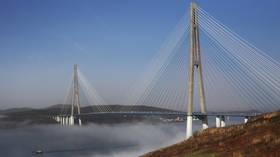Foreign firms flock to Russian offshore havens – media

A growing number of foreign companies and Russian firms registered overseas are moving their operations to special administrative regions (SARs) in Russia, Izvestia news outlet reported on Tuesday, citing data provided by the Ministry of Economic Development.
According to the report, a total of 87 companies moved to SARs on the Russky and Oktyabrsky islands in the first half of 2023 – up from 34 companies in the same period last year and more than during the whole of 2022. Some 62 international companies are now registered in the Russky Island SAR alone, with total assets of about 5 trillion rubles ($51 billion).
During the first eight months of the year, some 45 companies finalized their redomiciling procedures – a process by which a Russian company previously registered abroad moves its offices back to Russia. This is nearly three times the number that were redomiciled in the past four years. Some 80% of the firms moved home from Cyprus and 13% from the British Virgin Islands. Russian tech giant VK, previously registered on the British Virgin Islands, also recently announced its intention to move to one of the Russian offshore regions.
According to official data, a total of 268 organizations are currently registered in Russian SARs.
Analysts point to several reasons for the sudden popularity of Russian offshore havens. Some companies choose to redomicile there because their Russian owners are no longer able to do business in foreign jurisdictions due to Ukraine-related Western sanctions and the threat of their assets and property being seized abroad.
On the other hand, foreign companies operating in Russia move to SARs to avoid facing restrictions imposed by Moscow on foreign investors. Many companies with foreign participation now need to obtain permits to sell real estate, stakes and shares, while foreign shareholders are also deprived of the opportunity to receive dividends in foreign currency. Also, foreign companies with Russian beneficiaries face problems in obtaining accounting, legal consulting and banking services, which makes it increasingly difficult to operate businesses.
Companies registered in SARs are largely able to avoid these complications, analysts told Izvestia.
First established in 2018, SARs have a reduced corporate income tax of 10% instead of the traditional 20%, and do not have transportation or property taxes. They don’t have currency controls, and companies registered in these regions are allowed to operate under foreign corporate law, or the rules adopted in the country in which they were originally registered.
Under regulatory changes that came into force last month, organizations are also allowed to be registered in SARs under a new format – as an international holding company. The changes also covered the process of redomiciling, allowing foreign participants from ‘unfriendly’ states to be excluded from the ownership structure of companies through court. The provision was aimed at helping to resolve cases where redomiciling was blocked by foreign shareholders.
For more stories on economy & finance visit RT's business section













